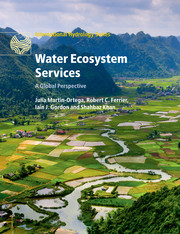Book contents
- Frontmatter
- Contents
- List of contributors
- Preface
- 1 Introduction
- 2 What defines ecosystem services-based approaches?
- Part I Addressing global challenges
- Part II Applying frameworks for water management and biodiversity conservation under an ecosystem services-based approach
- Part III Assessing water ecosystem services
- Part IV Broadening the perspective
- Index
- Plate Section
Preface
Published online by Cambridge University Press: 05 May 2015
- Frontmatter
- Contents
- List of contributors
- Preface
- 1 Introduction
- 2 What defines ecosystem services-based approaches?
- Part I Addressing global challenges
- Part II Applying frameworks for water management and biodiversity conservation under an ecosystem services-based approach
- Part III Assessing water ecosystem services
- Part IV Broadening the perspective
- Index
- Plate Section
Summary
Rapidly rising demand for food, raw materials, and energy is leading to intensifying human environmental footprints locally, nationally, and globally. This has consequences for the health of ecosystems and the services these provide. By considering the complex socio-economic interactions between the water, carbon-energy, food production, and climate cycles, UNESCO's Natural Science Programme (principally through its International Hydrological Programme and the Man and Biosphere Programme) promotes trans-disciplinary approaches to help restore, enhance, and protect the sustainability of land and water systems. This new book, in the International Hydrology Series, is well aligned with the aims and objectives of UNESCO's International Hydrological Programme by furthering the understanding and championing the potential of the ecosystem services-based approaches. Phase VIII (2014–2021) of the Programme is focused on ‘Water security: responses to local, regional, and global challenges’ and has a special theme on ‘Ecohydrology, engineering harmony for sustainable world’, to which this book is of direct relevance. The UNESCO Ecohydrology initiative involves the development of tools that integrate basin-wide human activities with hydrological cycles in order to sustain, improve, and restore the ecological functions of, and services in, river basins and coastal zones as a basis to support positive socio-economic development. Experiences gained through previous phases of the International Hydrological Programme, have shown that freshwater availability will become a major concern if no immediate action is taken to restore and enhance the associated ecosystems. Therefore, the knowledge presented in this book adds great value to inform global efforts on ensuring water security through UNESCO's ongoing initiatives at the river basin level, such as the Hydrology for the Environment, Life and Policy, Ecohydrology and Integrated Water Resources Management Guidelines.
The Hydrology for the Environment, Life and Policy in river basins initiative aims to deliver social, economic, and environmental benefits to stakeholders through research towards the sustainable use of water for human and environmental purposes.
- Type
- Chapter
- Information
- Water Ecosystem ServicesA Global Perspective, pp. xi - xiiPublisher: Cambridge University PressPrint publication year: 2015

